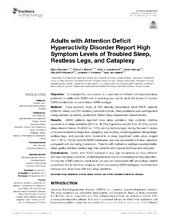| dc.contributor.author | Bjorvatn, Bjørn | en_US |
| dc.contributor.author | Brevik, Erlend Joramo | en_US |
| dc.contributor.author | Lundervold, Astri | en_US |
| dc.contributor.author | Halmøy, Anne | en_US |
| dc.contributor.author | Posserud, Maj-Britt Rocio | en_US |
| dc.contributor.author | Instanes, Johanne Telnes | en_US |
| dc.contributor.author | Haavik, Jan | en_US |
| dc.date.accessioned | 2018-03-01T13:21:38Z | |
| dc.date.available | 2018-03-01T13:21:38Z | |
| dc.date.issued | 2017-09-20 | |
| dc.Published | Bjorvatn B, Brevik EJ, Lundervold A, Halmøy A, Posserud M, Instanes JT, Haavik J. Adults with attention deficit hyperactivity disorder report high symptom levels of troubled sleep, restless legs, and cataplexy. Frontiers in Psychology. 2017;8:1621 | eng |
| dc.identifier.issn | 1664-1078 | |
| dc.identifier.uri | https://hdl.handle.net/1956/17441 | |
| dc.description.abstract | Objective: To compare the occurrence of a spectrum of different self-reported sleep problems in adults with ADHD and a control group, and to study the impact of current ADHD medication use and clinical ADHD subtype. Method: Cross-sectional study of 268 clinically ascertained adult ADHD patients (DSM-IV criteria) and 202 randomly selected controls. Sleep problems were self-reported using validated questions, partly from Global Sleep Assessment Questionnaire. Results: ADHD patients reported more sleep problems than controls: Lifetime occurrence of sleep problems (82.6 vs. 36.5%), hypnotics use (61.4 vs. 20.2%), current sleep duration below 6 h (26.6 vs. 7.6%), and symptoms/signs during the past 4 weeks of excessive daytime sleepiness, cataplexy, loud snoring, breathing pauses during sleep, restless legs, and periodic limb movements in sleep (significant odds ratios ranged from 1.82 to 14.55). Current ADHD medication use was associated with less cataplexy compared with not using medication. Patients with inattentive subtype reported better sleep quality and less restless legs than patients with hyperactive/impulsive subtypes. Conclusions: Adults with ADHD reported a very high occurrence of many different self-reported sleep problems, underlining the importance of screening for sleep disorders. Among the ADHD patients, medication use was not associated with more sleep-related symptoms, but in fact less cataplexy. When comparing ADHD subtypes, the inattentive subtype was associated with less sleep problems. | en_US |
| dc.language.iso | eng | eng |
| dc.publisher | Frontiers | eng |
| dc.rights | Attribution CC BY | eng |
| dc.rights.uri | http://creativecommons.org/licenses/by/4.0 | eng |
| dc.subject | sleep | eng |
| dc.subject | sleepiness | eng |
| dc.subject | snoring | eng |
| dc.subject | apnea | eng |
| dc.subject | restless legs | eng |
| dc.subject | ADHD | eng |
| dc.subject | stimulant medication | eng |
| dc.subject | subtypes | eng |
| dc.title | Adults with attention deficit hyperactivity disorder report high symptom levels of troubled sleep, restless legs, and cataplexy | en_US |
| dc.type | Peer reviewed | |
| dc.type | Journal article | |
| dc.date.updated | 2018-01-05T10:57:32Z | |
| dc.description.version | publishedVersion | en_US |
| dc.rights.holder | Copyright 2017 The Author(s) | |
| dc.identifier.doi | https://doi.org/10.3389/fpsyg.2017.01621 | |
| dc.identifier.cristin | 1512715 | |
| dc.source.journal | Frontiers in Psychology | |

